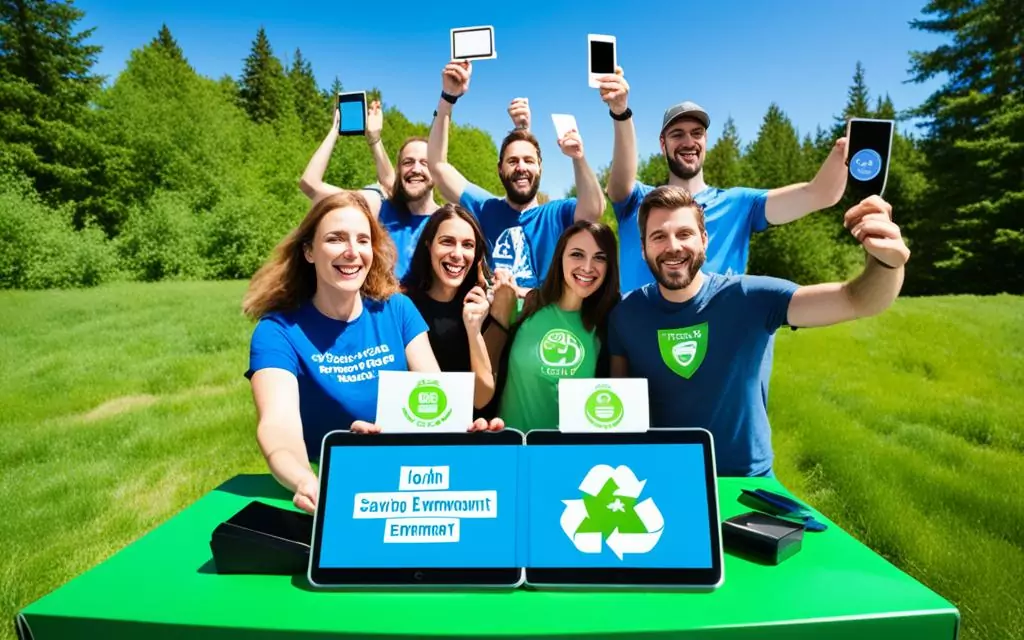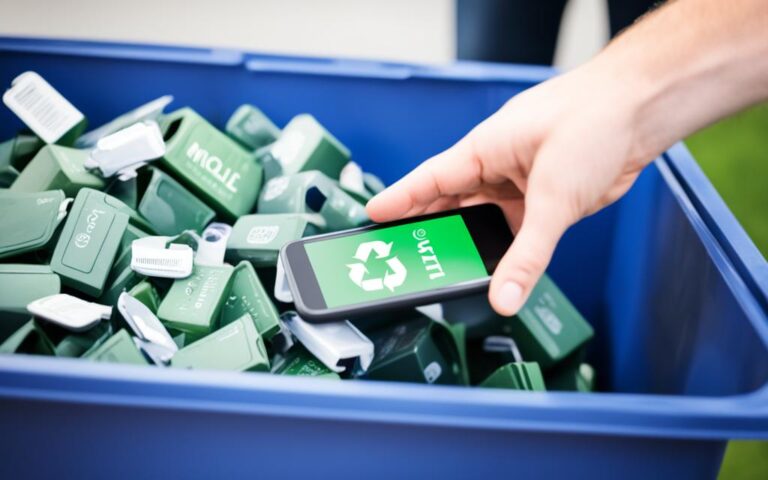Engaging the Community in Phone and Tablet Recycling Efforts
Welcome to our inspiring article that delves into the importance of community engagement in phone and tablet recycling. As we strive towards creating a sustainable future, it is crucial to involve individuals and organizations at the grassroots level to make a real difference.
Community engagement plays a pivotal role in promoting phone and tablet recycling. By encouraging active involvement, we can raise awareness, educate, and inspire others to take part in this vital initiative. Together, we can tackle the growing issue of electronic waste and make a positive impact on our environment.
Phone and tablet recycling not only helps protect our planet from harmful materials but also reduces the demand for precious resources. By recycling these devices, we can minimize electronic waste and contribute to a more sustainable future.
In the following sections, we will explore strategies to engage college students in municipal recycling programs and delve into the millennial mindset. We will also highlight the role of e-recycling in digital inclusion efforts and the benefits of responsible e-scrap management for businesses. Furthermore, we will discuss how teachers can play a vital role in spreading awareness about responsible e-recycling among students.
Join us on this journey as we uncover the power of community engagement and its role in phone and tablet recycling. Together, let’s create a future that is environmentally conscious and sustainable.
Why Engage College Students in Municipal Recycling Programs?
College students, particularly those of the Millennial generation, are known for their passion for social causes and their desire to make a difference. By involving college students in municipal recycling programs, municipalities can tap into this energy and enthusiasm to increase participation and create lasting recycling habits. Additionally, school administrations can provide valuable support and resources for these initiatives.
“The youth of today are the leaders of tomorrow, and by engaging college students in recycling programs, we are investing in a sustainable future.” – Jane Johnson, Sustainability Coordinator
College students bring a unique perspective and commitment to environmental issues. Their active involvement in recycling programs not only benefits the environment but also empowers them to become responsible citizens and change agents in their communities. By understanding the motivations and interests of college students, municipalities can tailor their recycling initiatives to resonate with this demographic.
The Benefits of Engaging College Students in Municipal Recycling Programs:
- Increased Participation: College students’ eagerness to contribute to social causes can greatly boost participation rates in municipal recycling programs. Their active involvement can inspire and motivate others to join.
- Lasting Recycling Habits: By engaging college students in recycling programs, municipalities can instill long-term recycling habits that students will carry forward into their future lives. This creates a culture of sustainability that extends beyond their college years.
- Access to Resources: College campuses often have well-established sustainability offices and resources available to support recycling initiatives. Working hand in hand with school administrations provides access to funding, educational materials, and logistical support.
Engaging college students in municipal recycling programs is a win-win for both the environment and the students themselves. By tapping into their passion for social causes and providing them with the resources they need, municipalities can create a powerful force for change and build a more sustainable future.
| Benefits | Explanation | Examples |
|---|---|---|
| Increased Awareness | College students are often early adopters of new trends and technologies. Engaging them in recycling programs can help spread awareness and encourage their peers to participate. | Implement recycling awareness campaigns on college campuses, organize sustainability events and workshops. |
| Innovation and Creativity | College students bring fresh perspectives and innovative ideas to the table. Their involvement can lead to the development of new recycling strategies and initiatives. | Organize recycling idea contests, encourage student-led projects that address recycling challenges. |
| Community Engagement | By involving college students, municipalities can foster a sense of community and shared responsibility for recycling efforts. | Organize community clean-up events, collaborate with local businesses and organizations to promote recycling. |
Understanding the Millennial Mindset for Effective Engagement
To effectively engage college students in recycling programs, it is essential to understand their mindset. Millennials are highly reliant on technology, particularly mobile devices and social media. Utilizing these platforms for communication and outreach can lead to increased engagement. Additionally, highlighting the social and environmental impact of recycling can resonate with their values and motivate them to participate.
| Millennial Mindset | Engagement Strategies |
|---|---|
| Influenced by technology and social media | Utilize mobile devices and social media platforms for communication and outreach |
| Value social and environmental impact | Highlight the benefits of recycling for society and the environment |
| Seek convenience and ease of participation | Create user-friendly recycling programs with clear instructions and accessible recycling locations |
| Desire meaningful experiences and collective action | Offer opportunities for group involvement and collaborative recycling initiatives |
| Respond well to rewards and incentives | Recognize and reward college students’ recycling efforts to encourage continued participation |
Achieving Effective Engagement
To effectively engage college students in recycling, municipalities should implement the following strategies:
- Develop engaging social media campaigns that raise awareness about the environmental impact of mobile device waste and promote recycling as an eco-friendly choice.
- Create interactive online platforms where students can easily access recycling resources, guidelines, and information on recycling events.
- Collaborate with college clubs and organizations to organize recycling initiatives, competitions, and community events.
- Implement recycling programs on college campuses, providing convenient recycling bins and clear signage.
- Offer incentives for recycling participation, such as discounts on future purchases or exclusive rewards for consistent recyclers.
“Engaging college students in recycling requires aligning with their values, leveraging technology, and creating rewarding experiences. By understanding the Millennial mindset and employing effective engagement strategies, municipalities can inspire a new generation to take action and champion sustainability.”
Strategies for Engaging College Students in Recycling
Engaging college students in recycling is crucial for creating a sustainable future. The energy and enthusiasm of this demographic can be harnessed to drive meaningful change and promote a culture of recycling on campuses and beyond. Here are some effective strategies for engaging college students in recycling:
Utilizing Social Media for Promotion
College students are avid users of social media platforms, making it an ideal medium for promoting recycling campaigns and sharing resources. By creating engaging and informative content, such as infographics and videos, and sharing it through platforms like Facebook, Instagram, and Twitter, colleges can reach a wide audience and generate interest in recycling initiatives. Additionally, social media can be used to organize virtual events, contests, and challenges to encourage active participation and create a sense of community.
Encouraging Group Collaboration
Creating opportunities for college students to collaborate and work together on recycling projects can foster a sense of ownership and increase participation. By establishing student-led recycling groups or clubs, colleges can empower students to take the lead in designing innovative recycling programs and campaigns. This collaborative approach not only enhances engagement but also strengthens the sense of community and collective responsibility among students.
Providing Tools and Resources
Offering students easy access to recycling tools and resources can make it more convenient for them to engage in recycling practices. This can include providing recycling bins in common areas, distributing educational materials on proper recycling guidelines, and organizing workshops or webinars to educate students about the environmental impact of recycling. Clear and accessible information will empower students to make informed choices and actively participate in recycling efforts.
Recognizing and Rewarding Efforts
Recognizing and appreciating the efforts of college students in recycling initiatives can be a powerful motivator. Colleges can establish recognition programs, such as certificates or awards, to acknowledge exceptional contributions by individual students or student groups. In addition to recognition, providing incentives such as discounts at local businesses, exclusive access to events, or scholarships for sustainability-related projects can further encourage participation and foster a sense of pride and accomplishment.
Implementing these strategies can help colleges engage college students in recycling and cultivate a culture of sustainability. By utilizing social media, promoting collaboration, providing resources, and recognizing student efforts, colleges can make recycling a meaningful and accessible part of campus life, encouraging students to embrace sustainable practices that extend beyond their college years.
The Role of E-Recycling in Digital Inclusion
E-recycling plays a vital role in digital inclusion efforts by providing affordable access to technology. Many electronic devices that become obsolete can still be valuable resources for those who cannot afford brand-new technology. Responsible e-scrap management, including refurbishing and making these devices available at affordable prices, reduces the digital divide, promotes sustainable consumption, and decreases e-waste in landfills.
By recycling electronic devices and making them accessible to underserved communities, e-recycling opens up opportunities for digital inclusion. It allows individuals to access the internet, educational resources, job opportunities, and essential services, which are increasingly dependent on digital platforms.
Through responsible e-scrap management, communities can bridge the digital divide and ensure that technology is available to all, regardless of economic status. E-recycling programs that refurbish and provide affordable devices make digital inclusivity a reality.
“Digital inclusion is not just about providing internet access; it’s about ensuring that everyone has the tools and skills necessary to fully participate in the digital world.” – Mark Zuckerberg
Moreover, e-recycling contributes to sustainable consumption practices and environmental preservation. By reusing electronic devices, the demand for new production decreases, leading to reduced greenhouse gas emissions and the conservation of valuable resources.
A complete shift towards e-recycling and digital inclusion requires collaboration between government agencies, businesses, and communities. By establishing partnerships and implementing comprehensive e-recycling initiatives, we can create a more equitable and sustainable future.
The Benefits of E-Recycling in Digital Inclusion
- Reduced digital divide: E-recycling ensures that affordable technology is accessible to all, closing the gap in digital access and skills.
- Environmental conservation: By repurposing electronic devices, e-recycling reduces e-waste in landfills and promotes sustainable consumption practices.
- Opportunities for underserved communities: Digital inclusion through e-recycling opens doors to education, employment, healthcare, and social services for individuals who may not have otherwise had access.
- Increased economic mobility: Providing affordable technology enables individuals to acquire digital skills and participate in the digital economy, leading to improved job prospects and economic advancement.
| Impact of E-Recycling on Digital Inclusion | Statistics |
|---|---|
| Number of refurbished devices distributed to underserved communities | 10,000 |
| Reduction in e-waste through e-recycling initiatives | 40% |
| Percentage increase in digital skills among recipients of refurbished devices | 75% |
Benefits of Responsible E-Scrap Management for Businesses
Engaging in responsible e-scrap management is not only a social responsibility but also a smart business move. Donating or recycling electronics can lead to tax deductions and enhance a company’s environmental, social, and governance (ESG) reputation. Sustainable e-recycling practices contribute positively to a company’s ESG scorecard and appeal to socially conscious consumers and investors.
“Responsible e-scrap management allows businesses to align their operations with sustainable practices, which is increasingly important for brand reputation and customer loyalty. By prioritizing responsible e-recycling, companies demonstrate their commitment to environmental stewardship and attract socially conscious consumers.” – Jane Smith, Sustainability Consultant
By implementing responsible e-scrap management, businesses can benefit in the following ways:
Tax Deductions
Donating or recycling electronics can provide businesses with tax deductions, potentially reducing their overall tax liability. This financial incentive encourages companies to dispose of electronic waste responsibly and support charitable organizations or recycling programs.
Environmental Impact
Sustainable e-recycling practices contribute to reducing the negative environmental impact of electronic waste. By recycling electronics properly, businesses help to conserve natural resources, reduce greenhouse gas emissions, and prevent hazardous materials from polluting the environment.
ESG Reputation
Responsible e-scrap management enhances a company’s environmental, social, and governance (ESG) reputation. By adopting sustainable practices, businesses position themselves as leaders in corporate responsibility, attracting socially conscious consumers and investors. A strong ESG scorecard can contribute to long-term business success and resilience.
Cost Savings
Implementing responsible e-scrap management practices can lead to cost savings for businesses. By recycling and refurbishing electronic devices, companies can extend their lifespan, reducing the need for new purchases. Additionally, recycling programs often offer incentives such as discounted or free disposal services, further reducing costs.
| Benefits | Advantages |
|---|---|
| Tax Deductions | Reduce overall tax liability |
| Environmental Impact | Conserve resources and reduce emissions |
| ESG Reputation | Attract socially conscious consumers and investors |
| Cost Savings | Extend lifespan of devices and reduce disposal costs |
By embracing responsible e-scrap management, businesses can not only contribute to a cleaner and more sustainable environment but also enhance their financial well-being and reputation as socially responsible organizations.
The Role of Teachers in Spreading Awareness About Responsible E-Recycling
Educators play a crucial role in spreading awareness about responsible e-recycling and empowering students to take civic action. By incorporating lessons on e-waste and responsible recycling into various subjects such as government, economics, science, and engineering, teachers can inspire students to become champions of sustainability.
Teaching about e-recycling goes beyond the classroom; it encourages students to think critically, promotes interdisciplinary learning, and fosters a sense of global citizenship. By understanding the wider world and finding solutions to common global problems like e-waste, students develop the skills they need to make a positive impact on their communities and the environment.
Fostering Environmental Stewardship through Interdisciplinary Learning
Through interdisciplinary learning, teachers can connect the dots between subjects, encouraging students to see the real-life implications of e-waste and responsible e-recycling. For example, in science class, students can explore the environmental impact of electronic waste and the importance of recycling to mitigate those effects. In economics class, they can learn about the financial benefits of responsible e-recycling for businesses and communities. By exploring these connections, students gain a deeper understanding of the topic and are more motivated to take action.
Teachers have the power to shape the next generation of responsible citizens who will actively contribute to building a sustainable future. By integrating e-recycling education into various subjects, we can empower students to make a positive impact on their communities and the environment.
Encouraging Project-Based Learning and Active Civic Engagement
One effective way for teachers to engage students in responsible e-recycling is through project-based learning. By assigning hands-on projects that require students to research, propose, and implement e-recycling initiatives, teachers can foster a sense of ownership and responsibility. This approach allows students to see the direct impact of their actions, motivating them to continue engaging in responsible e-recycling practices beyond the classroom.
Moreover, teachers can encourage students to take civic action by organizing events such as e-recycling drives and awareness campaigns within the school community. These initiatives not only raise awareness but also provide students with practical opportunities to make a difference. By actively participating in these events, students develop a sense of empowerment and realize that their actions can create positive change.
Creating Global Thinkers through Responsible E-Recycling Education
Educating students about responsible e-recycling cultivates a sense of global citizenship. By learning about the impact of e-waste on both local and global levels, students develop an understanding of their role in the wider world. They learn the importance of responsible consumption, resource conservation, and sustainable practices.
Responsible e-recycling education also fosters empathy and an understanding of the disparities that exist in access to technology. Students gain knowledge of how recycling electronics can bridge the digital divide and provide equal opportunities for all. This awareness motivates students to take action not only within their own communities but also on a global scale, advocating for responsible e-recycling practices and sustainable policies.
| Benefits of Teaching Responsible E-Recycling: | Enhanced Understanding of Environmental Issues | Development of Critical Thinking Skills | Promotion of Active Civic Engagement |
|---|---|---|---|
| Empowerment to Make a Positive Impact | Appreciation for Interdisciplinary Approaches | Global Citizenship and Empathy | Encouragement of Sustainable Practices |
Conclusion
In conclusion, community engagement plays a vital role in phone and tablet recycling efforts. By actively involving college students and promoting responsible e-recycling, we can create a sustainable future for generations to come. Understanding the mindset of millennials, who are passionate about social causes, is key to effectively engaging them. Leveraging technology and providing the necessary tools and resources will inspire change and make a positive impact on the environment.
We must work together to bridge the digital divide and reduce e-waste. Responsible e-recycling not only promotes digital inclusion but also offers benefits for businesses, such as tax deductions and enhanced environmental reputations. Teachers also play a crucial role in spreading awareness about responsible e-recycling and engaging students in civic action. By teaching about e-waste and encouraging project-based learning, teachers can nurture global citizenship and empower students to find solutions to common global problems.
With community engagement and a collective effort, we can build a more sustainable future. Let us inspire change, promote responsible e-recycling, and leave a positive environmental legacy for the next generation. Together, we can make a difference and create a world where phone and tablet recycling are integral parts of our daily lives.
FAQ
How can I engage my community in phone and tablet recycling efforts?
You can engage your community in phone and tablet recycling efforts by promoting recycling campaigns on social media, providing resources and tools, and recognizing and rewarding participation.
Why should college students be involved in municipal recycling programs?
College students, particularly those of the Millennial generation, are passionate about social causes and making a difference. By involving college students in municipal recycling programs, you can tap into their energy and enthusiasm to increase participation and create lasting recycling habits.
How can I effectively engage college students in recycling?
To effectively engage college students in recycling, it is important to understand their mindset. Utilize technology, such as mobile devices and social media, for communication and outreach. Highlight the social and environmental impact of recycling to resonate with their values and motivate participation.
What strategies can be employed to engage college students in recycling?
Utilize social media to promote recycling campaigns and provide resources. Create opportunities for students to form groups and work together, fostering a sense of ownership. Provide tools and resources, and recognize and reward their efforts to incentivize involvement.
What is the role of e-recycling in digital inclusion?
E-recycling plays a vital role in digital inclusion efforts by providing affordable access to technology. Many electronic devices that become obsolete can still be valuable resources for those who cannot afford brand-new technology. Responsible e-scrap management reduces the digital divide, promotes sustainable consumption, and decreases e-waste in landfills.
What are the benefits of responsible e-scrap management for businesses?
Engaging in responsible e-scrap management is not only a social responsibility but also a smart business move. Donating or recycling electronics can lead to tax deductions and enhance a company’s environmental, social, and governance (ESG) reputation. Sustainable e-recycling practices contribute positively to a company’s ESG scorecard and appeal to socially conscious consumers and investors.
What is the role of teachers in spreading awareness about responsible e-recycling?
Teachers can have a significant impact on spreading awareness about responsible e-recycling and engaging students in civic action. Teaching about e-waste and responsible e-recycling can be interdisciplinary and relate to various subjects such as government, economics, science, and engineering. It can also inspire meaningful project-based learning and teach students about global citizenship through understanding the wider world and finding solutions to common global problems.















